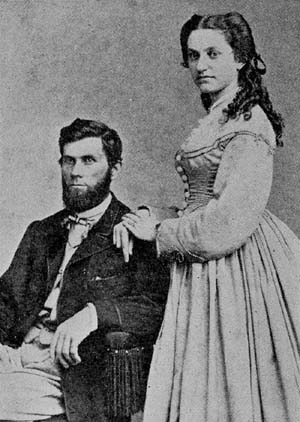
with his second wife, on their wedding trip
| Home | Information | Contents | Search | Links |
 |
with his second wife, on their wedding trip |
Edwin Evans Ewing, the eldest of the seven children of Patrick Ewing, Jr., and his wife, Isabella Evans, was born on his father's farm on Octoraro creek, not far from Rowlandsville, Cecil County, Maryland, January 9, 1824. The family, of Scotch-Irish extraction, was first represented in America by Edwin's great-grandfather, Joshua Ewing, who settled on the Octoraro late in the eighteenth century. His grandfather, Patrick Ewing, was a captain in the Continental army, and Patrick, Jr., Edwin's father, was a farmer and, for a time, County Commissioner.
Edwin attended school during the winters and helped his father on the farm during the summers, as so many other boys did in those days, until he was sixteen, and then worked on the farm until 1861. Asked for a sketch of his life and writings, he once said: "I didn't have any life. I just 'growed' like Topsy. I didn't have any 'educating.' I just picked it up. As for poetry, I never wrote any, only rhymes." Nevertheless, his poems were published in the local papers of Cecil and Lancaster counties, and in the Philadelphia Dollar Newspaper to which his brother, William Pinkney Ewing, also contributed.
In 1856 he made a trip to the, at that time, frontier country of Texas, much of the time on horseback, and his descriptions of the country and of his travels were published in a series of letters to the Cecil Whig of Elkton, Maryland. In 1861 he purchased that newspaper, which was the Union organ of the county, and carried on as editor and job printer until 1876, when he sold out and went to Topeka, Kansas, where he went into the grocery business for a short time. But once a newspaperman always a newspaperman, so in 1877, with Major J. K. Hudson, he purchased the Kansas Farmer and the Juvenile Magazine. They also established the Daily Capital. The climate of Kansas did not agree with Mr. Ewing, so he sold his interest in these papers and removed to Highlands, Macon County, North Carolina, where, in 1882, he established the Blue Ridge Enterprise. He disposed of this after a short period and returned to Maryland in 1885, where he and his three sons purchased the Rising Sun Journal, a weekly newspaper, which is still conducted by his sons under the name of The Midland Journal.
Mr. Ewing was married in 1863 to Clara Vaughan, of Camden, N. J. She died December 21, 1863, leaving a little daughter, Clara, six days old. On July 13, 1865, he married Emma McMurphy, of Elkton, Maryland, and by her had three sons, Cecil, Evans, and Halus. Mr. Ewing died at Rising Sun, Maryland, August 20, 1901.
Two novels written by Edwin E. Ewing were published by Beadle. "The Hag of the Wallowish" originally appeared as a serial in The Philadelphia Dollar Newspaper, Volume VII, beginning October 10, 1849. All of the characters were drawn from Ewing's neighbors, near Porter's Bridge, Cecil County, Maryland. The "Wallowish" was the Octoraro creek, which ran through that region. Irwin Beadle published the story in 1868, under the title, "The Witch of the Wallowish," as No. 41, Irwin's American Novels, and it was reprinted under the same title in Frank Starts American Novels and in the Pocket Novels. In 1887, it appeared in the octavo edition of the Boy's Library under the title "The Wily Witch's Ward." It was also republished, with an introduction by William Pinkney Ewing, Edwin's brother, in The Midland Journal in 1897. "The Bee Hunter" was published in 1866 in Irivin's American Novels, and reappeared as "The Hunter Guide" (1870) in Starts American Novels, and as "The Black Wolf" (1876) in Beadle's Pocket Novels.
REFERENCES: George Johnston, Poets and Poetry of Cecil County, Elkton, Maryland, 1887; George C. Ferine, The Poets and Verse-Writers of Maryland, Cincinnati, 1898, 181-84; Portrait and Biographical Record of Harford and Cecil Counties, Maryland, New York and Chicago, 1897, 438—41; personal communications from his son, Evans E. Ewing, March 14, 1941.
Irwin's American Novels. Nos. 9, 41
Dime Novels. No. 627
Starr's American Novels. Nos. 10, 46
Pocket Novels. Nos. 53, 217
Boy's Library (octavo). No. 185